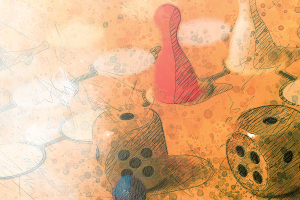As an independent-minded counsellor, I sometimes used to feel oppressed and alienated by the world of therapy today. Or, maybe I was just fed up with my perceived victim status when seeming to be bullied by the pseudoscientific regime now dominating our profession. I believe that counselling is as much an art as a science. My present rationale for person-centred psychotherapy practice owes more to existential philosophy than psychology.
I was inspired by a one-day workshop by Stephen Joseph on ‘post-traumatic growth’ to spend two years researching its relevance to the adult survivors of childhood sexual abuse, for whom I have continued to provide my voluntary counselling services. This article started life as a summary of my findings from a wide-ranging review of literature about this catalytic concept. It has become an exploration of how my extraordinary survivor clients have been inspirational muses, over seven years, for my developing person-centred approach to existential therapy.
Developing rationale
I do not set out to cure people, as in the tradition of the medical model. I believe that when people are confused and lost, the last thing they need is to be treated as ill or incompetent. What they need is some assistance in surveying the terrain and in deciding on the right route, so they can find their way again. They may also need a map and a compass.
Existential therapy does not set out to change people, as in the tradition of behavioural science. The assistance provided is aimed at finding direction in life by gaining insight into its workings. The process is one of reflection on one’s goals and intentions and on one’s general attitude towards living. The focus is therefore on life itself, rather than on the personality. The aim is to assist people in developing and consolidating their personal way of tackling life’s challenges, so that they can find their own meaning and direction. For my developing philosophical rationale, Emmy van Deurzen has provided a useful general aim for counselling and psychotherapy: ‘To clarify, reflect upon and understand life. Problems in living are confronted and life’s possibilities and boundaries are explored.’1
My own perspective tends towards the idea of facilitating unique processes of understanding and change for people, rather than trying to apply generic fixes for problems in living. In this respect, I am viewing the concept of ‘positive psychology’ carefully through the clarifying lens of phenomenology. My current rationale for practice is based on my understanding of phenomenology, derived from the excellent teaching about this different form of psychology provided by writers such as Ernesto Spinelli.2,3
In my view, ‘positive psychology’ has in itself been both misinterpreted and misused by some behavioural practitioners. I do not see it as some kind of universal panacea offering instant mood transformation to those of us who are unhappy. It is a constantly developing framework that encourages a change of perspective from curing illness to promoting wellbeing in the world of psychotherapy. I will leave the final word on our therapeutic ‘quest for happiness’ to van Deurzen: ‘There are greater values in life than happiness: there is love, truth, beauty, loyalty, honour, courage and freedom, and many other things beside.’4
Post-traumatic stress
According to recent research,5,6 post-traumatic stress is a potential engine of change, as well as a difficult life experience to endure. Post-traumatic growth may be achieved through a natural internal self-adjustment process of ‘taking stock’ and ‘harvesting hope’,6 for which various experiences of stress resulting from trauma gradually become powerful catalysts for achieving positive life changes in both personal perception and potential.
For many trauma sufferers, a process of ‘re-authoring’6 their life may begin as a result of the stress they experience, rather than in spite of it. The ‘expert companionship’ offered by counselling relationships is a highly sensitive process of working alongside people as they find their own meaning for what has happened, create new narratives and move on with their lives.5–7
Positive psychology and post-traumatic growth
In recent research about post-traumatic growth following experiences of childhood sexual abuse that have resulted in long-term post-traumatic stress, survivors have described moving from coping strategies, designed to reduce negative affect and increase positive affect, towards a sense of living more fully in an attempt to ‘reconstruct their shattered lives’.8 Dimensions of this more ‘flourishing’9 change have been described as expanding from ‘hedonistic’ coping towards a more ‘eudaimonic’ growth perspective.6
The message for counselling practice in helping survivors of childhood sexual abuse, according to Walker-Williams,8 seems to be similar to Seligman’s original mission for ‘positive psychology’.9 The aim is to not solely ‘fix’ what is ‘broken’, it is also a ‘recognition of an individual’s strengths and virtues’.8 This is clearly a much broader notion of promoting psychological wellbeing, rather than focusing on the diagnosis and treatment of symptoms of post-traumatic stress. There is now a breadth of research literature that highlights how the presence of psychological wellbeing is a preventative factor for relapse and thus consolidates recovery from trauma.
Recent studies support the idea that, in order to achieve growth, the development of positive self-regard is a powerful factor.10 Clinical interventions that aim to facilitate post- traumatic growth can, for example, incorporate a focus on developing a more positive sense of self-worth. One example of this is found in person-centred therapy, which specifically aims to facilitate unconditional positive self-regard.11,12
Given that the research I have reviewed in the field of post-traumatic stress therapy with victims of childhood sexual abuse also indicates that trust in relationships and self-worth tend to be key issues for many survivors, the developing counselling relationship seems an appropriate aspect of client experience to explore when evaluating outcomes. These enduring life themes are echoed in the diverse voices of my past clients over the years.
Signposts to self-help
Joseph also offers the ‘THRIVE’ model as a guide to self-help for people recovering from trauma. The model presents reflective exercises in a detailed series of six stages or ‘signposts’ to assist survivors through the process of coping and moving on with their lives. This practical form of support represents a valuable outcome of his thorough research of the topic over 25 years.
He describes the following signposts in much greater detail in his book:6
- taking stock
- harvesting hope
- re-authoring
- identifying change
- valuing change
- expressing change in action.
Reflecting on my own experience and the narrative of past clients, I have found this guidance extremely helpful when reviewing and assessing outcomes with counselling service users. Joseph also advises that therapy can be helpful in teaching new coping skills, but he warns that therapists cannot teach people meaning. Meaning is unique for each person. He suggests that what we can do is to support people in their own search for meaning. What people may need are ‘expert companions’ alongside them in their journey to understand and rebuild their lives.5,6
In addition, the American Psychological Association has created educational materials that provide advice for people who have encountered adversity on the best ways of coping:
- making connections with others
- avoiding seeing crises as insurmountable
- accepting that change is part of life
- moving towards goals
- taking decisive actions
- looking for opportunities for self-discovery
- nurturing a positive view of oneself
- learning from the past
- maintaining a hopeful outlook
- self-care.
In my experience, being present alongside clients means not only listening carefully, and paying close attention to everything that happens in the counselling room, but also giving them the most authentic and genuine version I can of myself and how I am experiencing our developing relationship. I also try to bracket off my own judgment in order to open my mind more fully to the client’s worldview. This process is very much a work in progress for me, but the aim is to truly collaborate on mutually understanding what is happening for the client. The traditional unequal power relationship between therapist and client tends to get in the way of genuine phenomenological creativity.
A survivor’s story
I am delighted that one client has continued with autobiographical writing after our year of mutually therapeutic weekly companionship. This client was one of the inspirational muses for my current approach to practice. She despaired about the state of the world and was angry about patriarchal incompetence. She undoubtedly had been seriously let down by all the significant others in her life. This client inspired me because of her core strength, resilience and determination to be a good-enough single parent and provider to her teenage daughter. She is still hoping to somehow find love, despite having never experienced any nurturing model of what this might look like during her serially abused formative years. She embodies for me the ability of the human spirit to triumph over seemingly overwhelming adversity, defying even her own pragmatic expectations of disappointment and ultimate loneliness. I can’t wait to read her story.
Using the PWB-PTCQ
I now use Joseph’s Psychological Well-Being-Post-traumatic Changes Questionnaire (PWB-PTCQ) with my clients to help them monitor how they feel about themselves and how they think they have changed. The dimensions of change that the questionnaire considers, represent a holistic perspective of human experience and are philosophical and existential in their nature. Although there are a total of 18 questions, there are six overall ‘domains’ of psychological wellbeing, which are considered as follows:
- self-acceptance
- autonomy
- purpose in life
- relationships
- sense of mastery
- personal growth
I find the questionnaire a helpful tool for regularly reviewing and tracking changes and developments in clients. It is also a useful prompt for opening up conversations with clients about how they have changed. Survivors have certainly given me positive feedback about using the questionnaire as part of the reviewing process. My autobiographical client reported that the scores reinforced her growing, previously fragile, self-belief, and her ability to express the changes she was experiencing in her life more confidently.
Conclusions
In his moving and compassionate personal account of experiences as a psychotherapist and trauma specialist, Marzillier writes: ‘One of the major changes that occurs after trauma is the rupturing of the narrative of one’s life, of that which gives us our sense of identity and our place in the world.’7 He goes on to conclude that: ‘Weaving a new narrative, one that takes these changes into account, is the overarching task for the trauma sufferer; not just recovering from the distress but being able to incorporate the experience and move on.’ Much research has been conducted over the last 30 years providing tested evidence of the therapeutic value of telling, and listening to, personal stories.13
I have concluded from both my experience and research that post-traumatic stress, like loss and grief, is a challenging yet vital aspect of human existence that we all experience and process in individual ways. The particular form of companionship offered by the counselling relationship is one way in which people may be helped to find their own meaning, ‘weave a new narrative’ and move on.
In my view, the process may be sensitively shared, but not led, by the counsellor. It should be at the client’s pace and, ideally, not constrained by external expectations of either outcome or time limits for completion. Outcome measures
are sometimes useful tools available to clients and counsellors to help them monitor the often-difficult processes of change, which are unique to each individual. Joseph’s PWB-PTCQ is just one tried-and-tested example of a holistic form of outcome measure that respects the autonomy of survivors in understanding the world, creating new narratives and moving on with their lives.
Christopher Tovey is a counsellor in private practice with 50 years’ experience and professional development in the caring professions, including advanced qualifications in continuing education, social work and psychotherapy. He has been practising person-centred therapy for the last seven years. kenilworthcounselling.co.uk
More from Private Practice

They think it’s Alzheimer’s
Open article: When her mum was diagnosed with Alzheimer’s, Trudi Dargan already knew at some level that the memory lapses and confusion she’d been experiencing were more than the usual ones that come with ageing. Private Practice, Summer 2017

When is it time to retire?
Open article: Anne Power explores some issues faced by therapists approaching retirement and the challenge of closing down a service they may have been offering for decades. Private Practice, Spring 2017

What is being in a relationship really like?
Open article: Mary Morgan explores why relationships are difficult, and why we might need them. Private Practice, Winter 2016
References
1. van Deurzen E. Existential counselling and psychotherapy in practice (3rd edition). London: Sage; 2012.
2. Spinelli E. The interpreted world: an introduction to phenomenological psychology (2nd edition). London: Sage; 2005.
3. Spinelli E. Practising existential therapy: the relational world (2nd edition). London: Sage; 2015.
4. van Deurzen E. Psychotherapy and the quest for happiness. London: Sage; 2009.
5. Calhoun LG, Tedeschi RG. Posttraumatic growth in clinical practice. New York: Routledge; 2013.
6. Joseph S. What doesn’t kill us: a guide to overcoming adversity and moving forward. London: Piatkus; 2013.
7. Marzillier J. To hell and back: personal experiences of trauma and how we recover and move on. London: Constable & Robinson; 2012.
8. Walker-Williams H et al. Coping behaviour, posttraumatic growth and psychological well-being in women with childhood sexual abuse. Journal of Psychology in Africa 2013; 23(2): 259–268.
9. Seligman MEP. Flourish. a new understanding of happiness and well-being – and how to achieve them. London: Nicholas Brealey; 2011.
10. Patterson TG, Joseph S. Unconditional positive self-regard. In: Bernard ME (ed). The strength of self-acceptance: theory, practice and research. New York: Springer; 2013 (pp93–106).
11. Rogers CR. Client-centred therapy: its current practice, implications and theory. Boston: Houghton-Mifflin; 1951.
12. Rogers CR. A theory of therapy, personality and interpersonal relationships as developed in the client-centred framework. In: Koch S (ed). Psychology: a study of a science (volume 3): formulations of the person and the social context. New York: McGraw-Hill; 2013 (pp184–256).
13. Pennebaker JW. Opening up: the healing power of expressing emotions. New York: Guilford; 1997.
